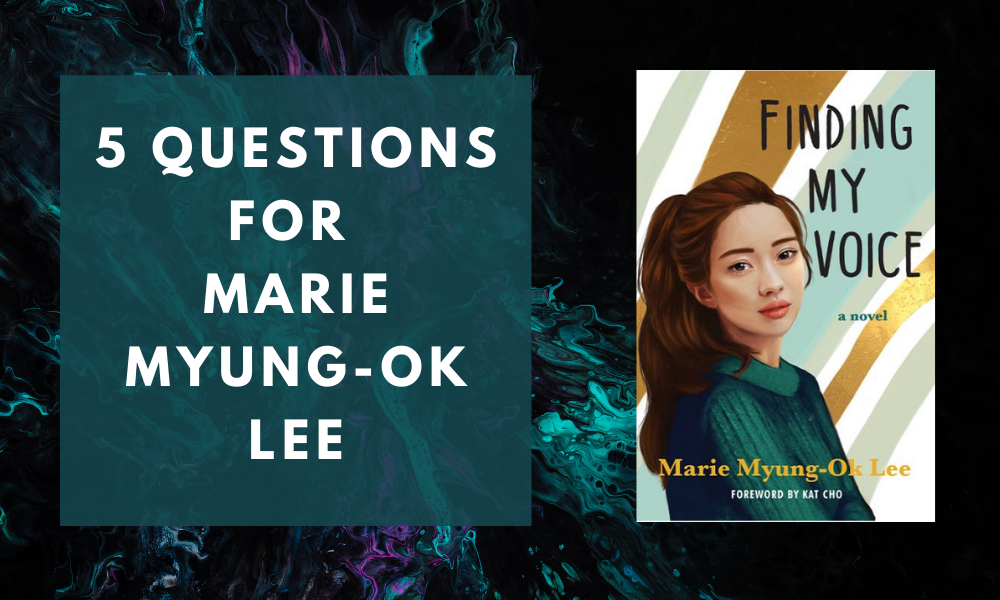Marie Myung-Ok Lee is the author of two other YA novels: Necessary Roughness and Saying Goodbye, the sequel to Finding my Voice, as well as the middle grade novels If It Hadn’t Been for Yoon Jun and Night of the Chupacabras. Her books have won a number of awards, including Friends of American Writers, New York Public Library’s Best Books for the Teen Age, and NCTE’s Children’s Choice. She has been a judge for the National Book Awards, a Fulbright Fellow, and was one of the first Korean American journalists allowed into North Korea.
.
Voyage: What was the inspiration behind your novel, Finding My Voice? What made you want to tell this story?
Marie Myung-Ok Lee: I grew up in a rural area of Minnesota, a very small all-white town, and spent a lot of my childhood feeling aliened. My parents had immigrated from Korea right after the Korean War and after spending some time in Alabama, they settled in Minnesota, where I and my four siblings were born. My brothers are a lot older so I ended up spending a lot of time by myself. I enjoyed reading the most and won all the summer reading contests. The only thing was, I could never find a book with an Asian protagonist. I loved books like The Outsiders (for obvious reasons) but the only book I ever saw with an Asian on the cover was Farewell to Manzanar, and that wasn’t even written by an Asian American (it’s written by her husband). I mostly, then, read adult books (kind of randomly) but I also admired Judy Blume for the risks she took on themes, so I started writing a book about an Asian American girl who gets called racial slurs. I hadn’t seen either the Asian American protagonist OR a book about racism and one’s parents being immigrants, so it was a little weird to me (why hadn’t anyone written about that before? Maybe no one was interested?), but I went ahead and wrote it.
.
V: When you write your stories, what is the one thing you hope readers will take away?
MML: Writing is all about empathy. One of the biggest decisions I had to make while struggling to get a publisher even interested in my book was when a big editor at Bantam Double Dell was taking a look at the book but she insisted I re-write it in third person from first person present—that tense, she said, was “amateurish.”
I tried it, because I was trying to get published! But then I realized, I had a real reason for choosing the tense/person: I wanted the READER to be able to feel what the protagonist did exactly at the moment someone called her a ch***— and you can really only do that with the immediacy of first person present, even though indeed that has its own limitations—but I was happy with my choice, even though it took a long time for the book to get published.
.
V: What was the hardest scene of Finding My Voice to write?
MML: Probably the scene after the high school graduation when she has to talk to her father about race. This didn’t happen in real life, but it’s a distillation maybe of what I wish could have happened, in that there was a certain feeling of shame and also not wanting to upset my parents that kept us from talking about it.
.
V: If you could tell your younger writer self anything, what would it be?
MML: Only the writing is important, so keep working at that, reading, etc. Everything else will work out in its own way. Also: enjoy the process!
.
V: What are your writing must-haves?
MML: Haha, I love this question:
- French pressed coffee, very dark and hand-ground
- At least 3 candles
- Notebook (I write first drafts by hand)
- Fountain pen with Korean inks that have names like “heavenly sky,” “Han River”
- Bulletin board
- PLANTS
- Magical things (like coins) that I have found over the years.
.
Head to our Instagram page (@voyageya) to hear Marie read the first page of Finding My Voice! Find Marie’s video under the IGTV tab.

